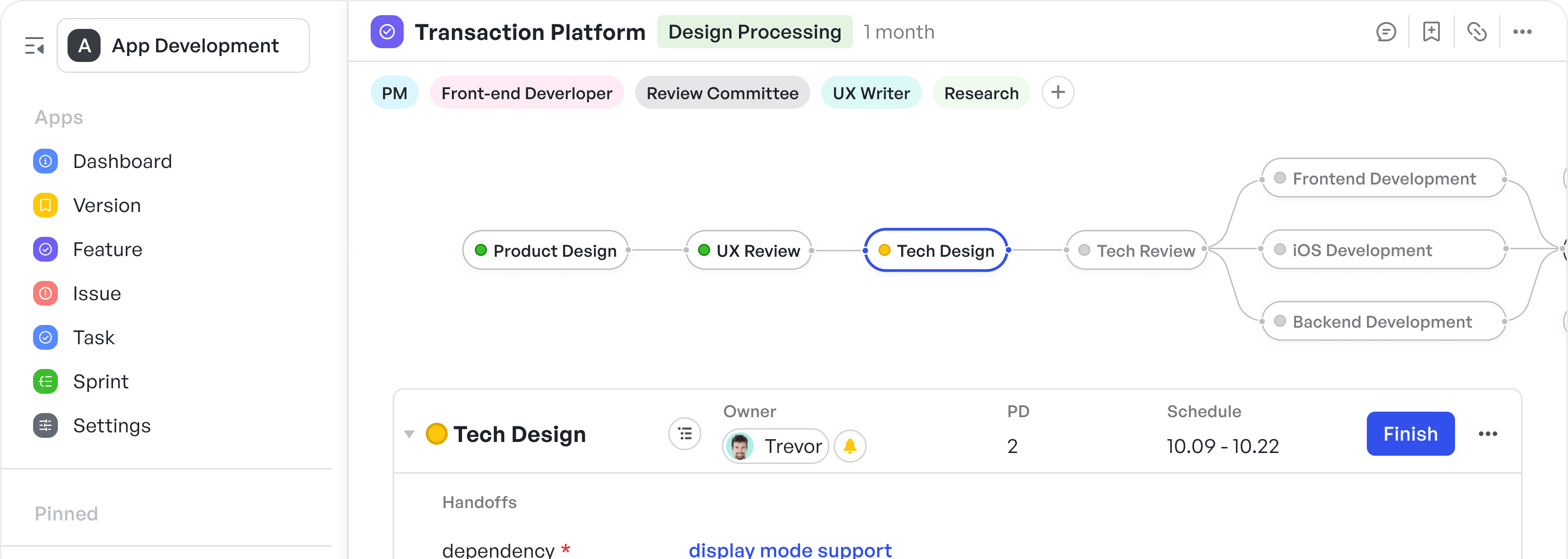Project Management for Managers: Software & Best Practices 2025

Effective project management equips managers with the skills to drive successful outcomes and lead high-performing teams. Research by the Project Management Institute shows that organizations with mature project management practices complete 88% of their projects on time and 90% within budget.
However, a recent survey indicates that 70% of organizations experienced at least one project failure in the past 12 months, with poor project management as a key contributing factor. Mastering proven project management strategies and techniques helps avoid common pitfalls and set projects up for success.
This article shares the top project management tips and best practices every manager should know to plan, execute, and deliver projects confidently.
Comparing the Top Project Management for Managers
Quick Glance List and Comparison Table
| Software | Core Features Score (1-10) | Pricing Tiers | Deployment Options | Mobile Functionality | Security Features | Integration Capabilities | Customer Support | Scalability |
|---|---|---|---|---|---|---|---|---|
| Meegle | 8 | Free Plan Available | Cloud | Yes | Advanced | Extensive | 24/7 Support | High |
| Online PM Courses | 7 | Basic ($15/course), Premium ($40/course) | Cloud | No | Basic | Limited | Email Support | Medium |
| PMI | 9 | Membership ($129/year), Certification (varies) | Cloud | Yes | Advanced | Extensive | Comprehensive | High |
| Atlassian | 9 | Free, Standard ($7/user), Premium ($14/user) | Cloud, On-premise | Yes | Advanced | Extensive | 24/7 Support | High |
| FranklinCovey | 8 | Course-based (varies) | Cloud | Yes | Basic | Limited | Email Support | Medium |
| Coursera | 8 | Single Course ($39/month), Specialization (varies) | Cloud | Yes | Basic | Extensive | Comprehensive | High |
| Google Grow | 8 | Free, Certification ($39/month) | Cloud | Yes | Advanced | Extensive | Comprehensive | High |
| LinkedIn Learning | 8 | Basic ($29.99/month), Premium ($39.99/month) | Cloud | Yes | Advanced | Extensive | 24/7 Support | High |
| ProjectManagement.com | 7 | Free, Premium ($10/month) | Cloud | Yes | Basic | Limited | Email Support | Medium |
| Wrike | 9 | Free, Professional ($9.80/user), Business ($24.80/user) | Cloud | Yes | Advanced | Extensive | 24/7 Support | High |
Best Project Management for Managers in 2025
1. Meegle
Meegle serves as a versatile tool in the project management arena, offering robust features for small to medium-sized enterprises. Its scalability and extensive integration capabilities make it ideal for growing businesses. Meegle focuses on intuitive design and seamless user experience, simplifying complex project management tasks, allowing managers to concentrate on strategic planning and execution.
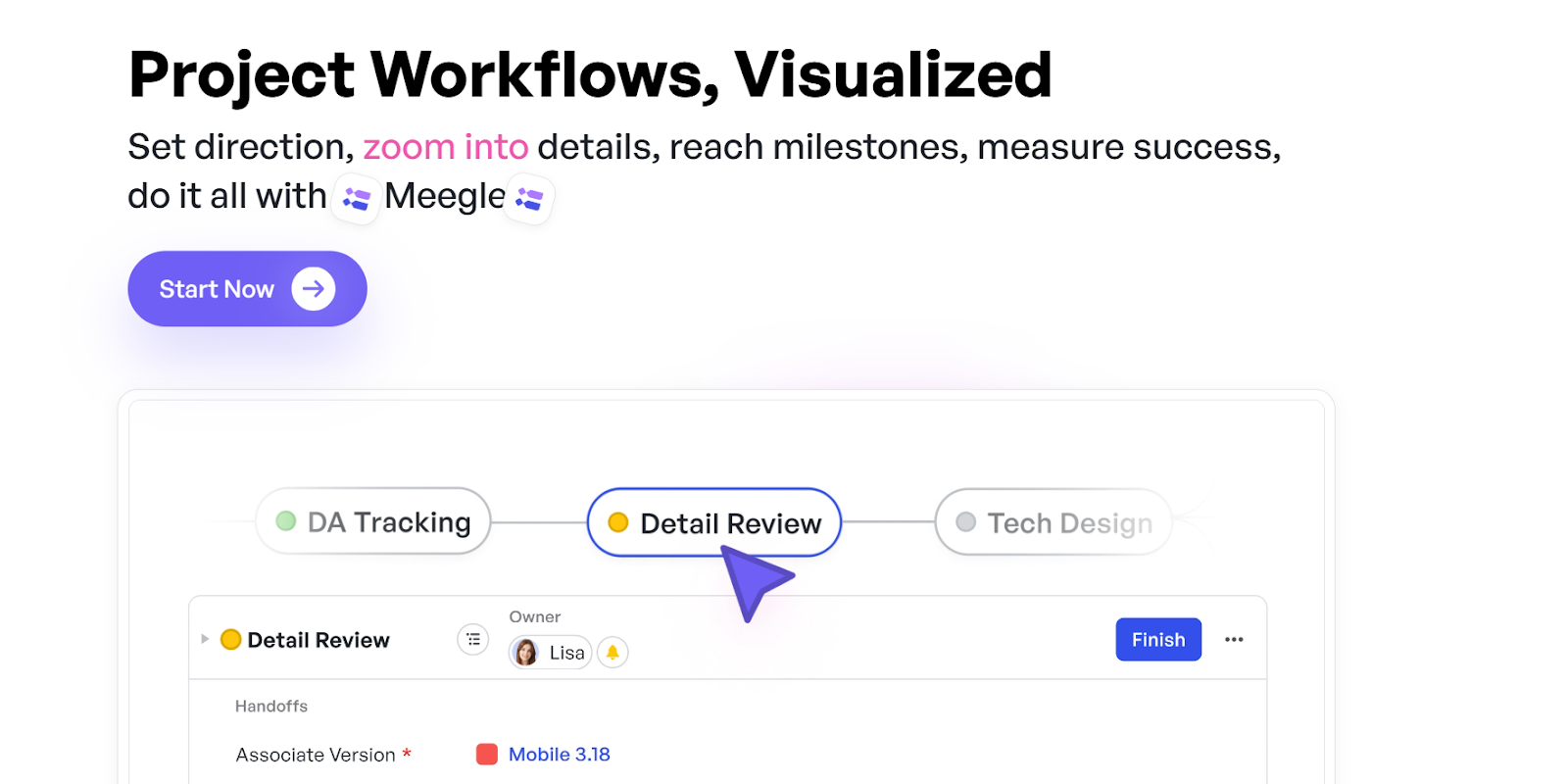 Meegle as a Project Management Software
Meegle as a Project Management SoftwareDetailed Key Features:
- Task Management: Users can create, assign, and track tasks with ease, enhancing team collaboration and productivity.
- Time Tracking: Real-time tracking of project timelines enables managers to identify bottlenecks and optimize workflows.
- Risk Management: Tools for identifying and mitigating project risks ensure projects remain on track.
- Change Management: Facilitates smooth transitions within projects, minimizing disruption.
- Budget Management: Precise budget tracking and forecasting aid in financial planning and resource allocation.
- Conflict Management: Provides conflict resolution tools to handle team disputes amicably.
- Integration with Third-Party Tools: Integrates with major platforms like Slack, Microsoft Teams, and Google Workspace.
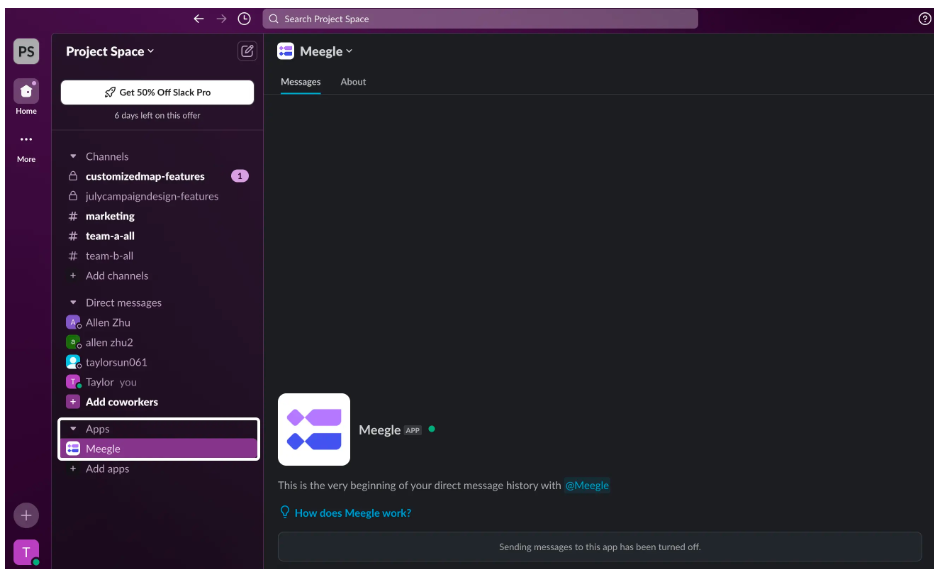 Meegle syncs with communication tools like Slack
Meegle syncs with communication tools like SlackUser Interface and Experience Analysis:
Meegle features an intuitive interface that simplifies navigation. The design ensures users access key features quickly without a steep learning curve. Customization options allow managers to tailor the interface to specific project needs, enhancing usability.
Implementation Complexity Assessment:
Meegle's straightforward implementation with cloud deployment ensures quick setup. Extensive onboarding resources and dedicated support assist managers during the initial setup phase. Migration support ensures data integrity for organizations transitioning from other tools.
Integration Capabilities:
- Slack
- Microsoft Teams
- Google Workspace
- Zapier
- Trello
- Asana
Pros:
- Comprehensive feature set: Covers task, time, risk, and budget management.
- Scalable solution: Accommodates increasing project complexity and team size.
- User-friendly interface: Customizable dashboards enhance user experience.
- Seamless integration: Connects with popular third-party tools.
- Strong support system: Offers 24/7 customer support and comprehensive onboarding resources.
- Cost-effective pricing: Competitive pricing tiers cater to various business sizes.
Cons:
- Limited offline functionality: Requires internet connectivity for most features.
- Advanced features may require training: Complex features might need additional training.
- Customization limitations: Some features have limited configuration options.
- Mobile app needs improvement: Lacks some desktop functionalities.
- Integration setup can be complex: Initial setup of integrations may need technical expertise.
Meegle’s pricing details
- Free: Up to 20 seats. For small teams to experience the magic of visual workflow
- Standard plan: $8/user/month, ideal for small-sized teams to optimize collaboration and manage projects effortlessly (billed annually)
- Premium plan: $12/user/month, ideal for mid-sized organizations to scale up project management and enhance team collaboration (billed annually)
- Enterprise plan: Custom pricing tailored for large organizations with specific needs (billed annually)
Best For:
- Industries: Technology, Marketing, Consulting
- Company Size: Small to medium-sized businesses
- Budget Considerations: Affordable for startups and growing companies
- Use Cases: Ideal for teams needing robust tools with extensive integration capabilities.
Not Recommended For:
- Large enterprises with highly specialized needs.
- Companies requiring extensive offline capabilities.
Bottom Line:
Meegle excels with its comprehensive feature set and user-friendly interface, making it an excellent choice for growing businesses. Its strong integration capabilities and scalable pricing ensure a high return on investment.
2. Online PM Courses
Online PM Courses provides a structured learning environment for managers to enhance their project management skills. By offering flexible learning options, it caters to busy managers who need to balance learning with professional responsibilities.
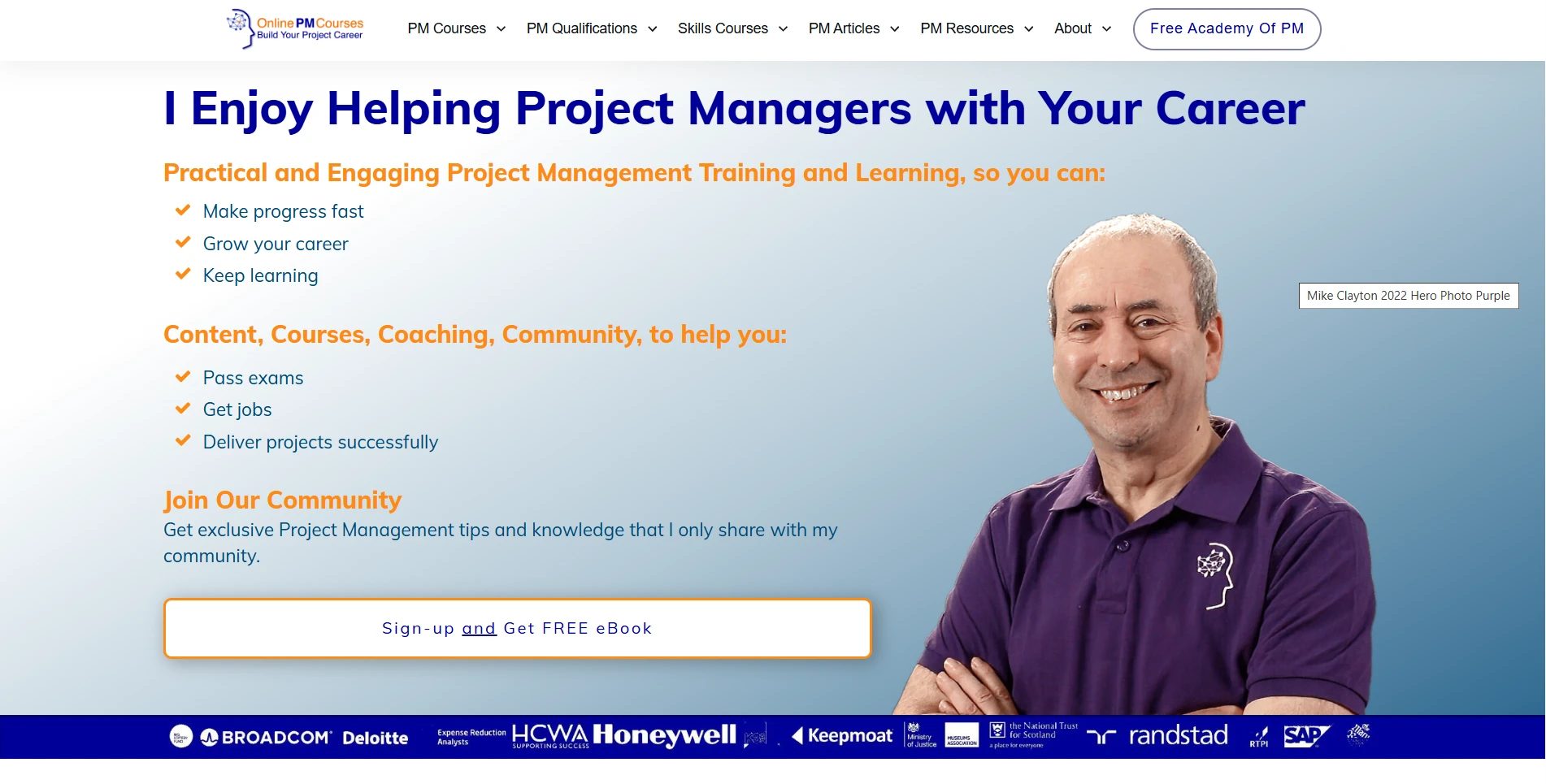 Source: Online PM Courses
Source: Online PM CoursesDetailed Key Features:
- Self-paced Learning: Offers flexibility for managers to learn at their own pace.
- Expert Instruction: Courses led by industry experts provide valuable insights.
- Certification Opportunities: Offers certificates upon course completion.
- Comprehensive Course Library: Covers a wide range of topics.
- Interactive Learning Modules: Engages learners through quizzes and practical exercises.
- Access to Online Community: Connects learners with peers and instructors.
- Regular Course Updates: Ensures content remains current with industry trends.
User Interface and Experience Analysis:
The platform's interface is straightforward, emphasizing ease of navigation. The course layout allows users to track progress and access materials effortlessly.
Implementation Complexity Assessment:
As a cloud-based platform, implementation is minimal. Users create an account and gain access to the course library immediately.
Integration Capabilities:
- Learning Management Systems (LMS)
- Email platforms for updates and notifications
Pros:
- Diverse course offerings: Covers a broad spectrum of project management topics.
- Flexibility: Self-paced learning accommodates varying schedules.
- Expert instruction: Courses taught by seasoned professionals.
- Certification: Enhances professional credibility.
- Community access: Provides a platform for networking.
- Regular content updates: Ensures learners have access to the latest practices.
Cons:
- Limited hands-on practice: May lack practical application opportunities.
- No mobile app: Learning is restricted to web access.
- Basic integration capabilities: Limited to LMS and email platforms.
- Requires self-discipline: Demands strong time management skills.
- Course costs can add up: Multiple courses may lead to higher expenses.
Pricing Details:
- Basic Courses: $15 per course.
- Premium Courses: $40 per course.
Best For:
- Industries: Education, Professional Services, Consulting
- Company Size: Individuals and small teams
- Budget Considerations: Cost-effective for individuals
- Use Cases: Ideal for managers seeking formal education and certification.
Not Recommended For:
- Large teams needing collaborative tools.
- Organizations requiring extensive integration.
Bottom Line:
Online PM Courses excel in providing flexible, expert-led education. Its focus on professional development and certification makes it valuable for managers seeking to enhance their skills.
3. Project Management Institute (PMI)
PMI is a globally recognized authority in project management, offering certifications and resources that elevate professional standards. Known for rigorous certification programs, PMI supports managers in achieving excellence.
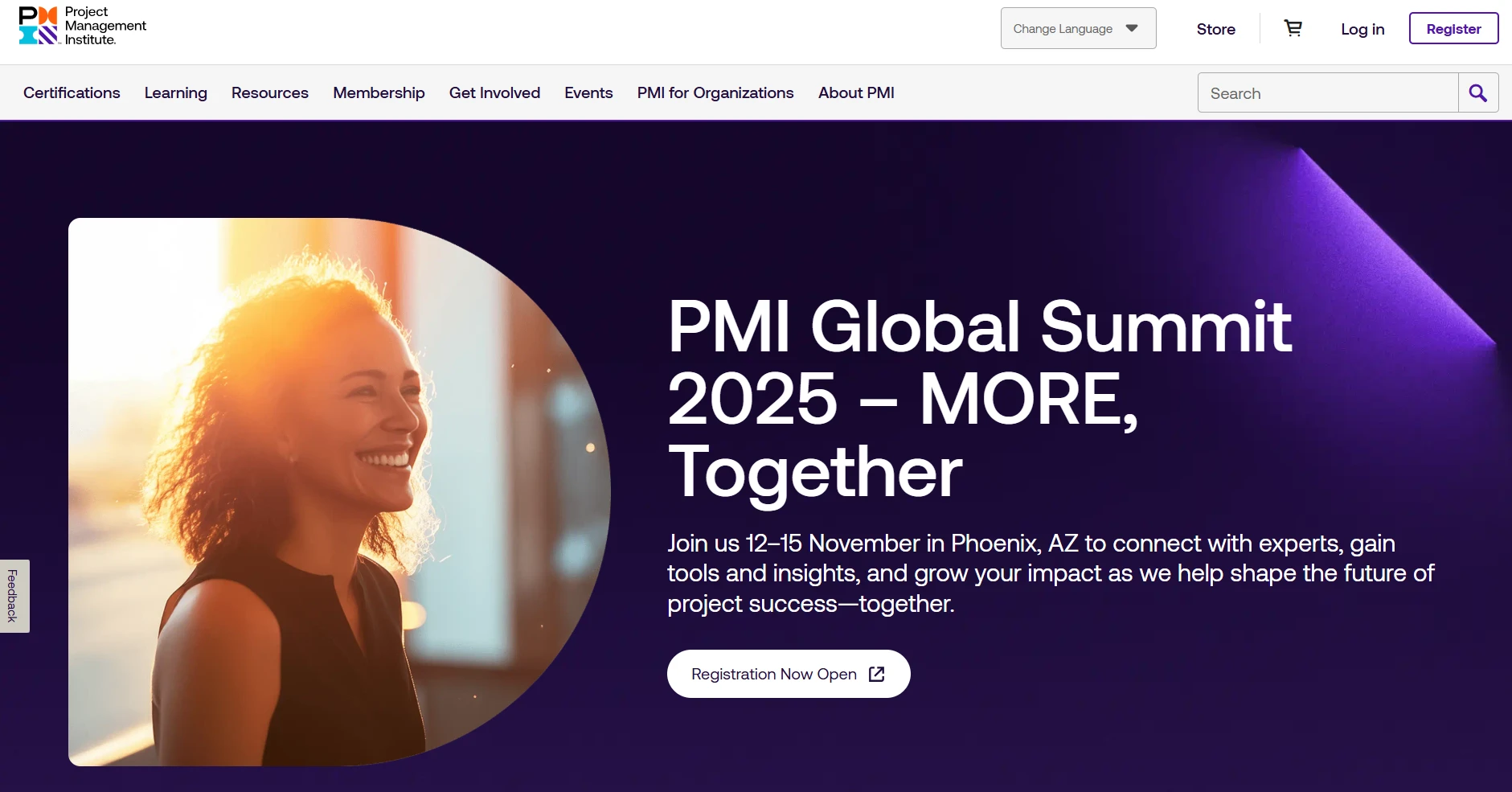 Source: Project Management Insititute
Source: Project Management InsitituteDetailed Key Features:
- Certifications: Offers prestigious certifications recognized worldwide.
- Knowledge Base: Access to a comprehensive library of resources.
- Global Community: Connects members with professionals and industry experts.
- Standards Development: Contributes to standards and best practices.
- Events and Conferences: Hosts global events for learning and networking.
- Digital Badges: Provides digital credentials.
- Research and Advocacy: Engages in research to advance the profession.
User Interface and Experience Analysis:
PMI's platform is well-organized, providing easy access to resources and certification information.
Implementation Complexity Assessment:
Preparing for certifications requires significant time commitment. PMI provides structured study materials to support candidates.
Integration Capabilities:
- Learning Management Systems (LMS)
- Professional networking platforms
Pros:
- Global recognition: Certifications are highly valued internationally.
- Comprehensive resources: Extensive library of knowledge and research.
- Professional network: Connects members globally.
- Events and learning opportunities: Access to conferences and seminars.
- Standards and best practices: Contributes to industry standards.
- Advocacy and research: Engages in initiatives advancing the profession.
Cons:
- Certification preparation time: Requires significant time and effort.
- Membership costs: Fees may be prohibitive for some.
- Limited practical application: Focuses on theoretical knowledge.
- Complex certification process: Rigorous and demanding.
- Not a project management tool: Primarily a certification and resource provider.
Pricing Details:
- Membership Fee: $129/year.
- Certification Fees: Vary by certification.
Best For:
- Industries: Construction, IT, Healthcare
- Company Size: Individuals and organizations prioritizing certification
- Budget Considerations: Suitable for career advancement
- Use Cases: Ideal for managers seeking recognized certifications.
Not Recommended For:
- Teams seeking project management software.
- Companies with limited budgets for development.
Bottom Line:
PMI remains the gold standard for project management certification, offering unparalleled recognition and professional development opportunities.
Related Read: An insider’s look at Project Management Institute
4. Atlassian
Atlassian provides a powerful suite of tools facilitating collaboration and productivity. With products like Jira, Confluence, and Trello, Atlassian serves a wide range of industries.
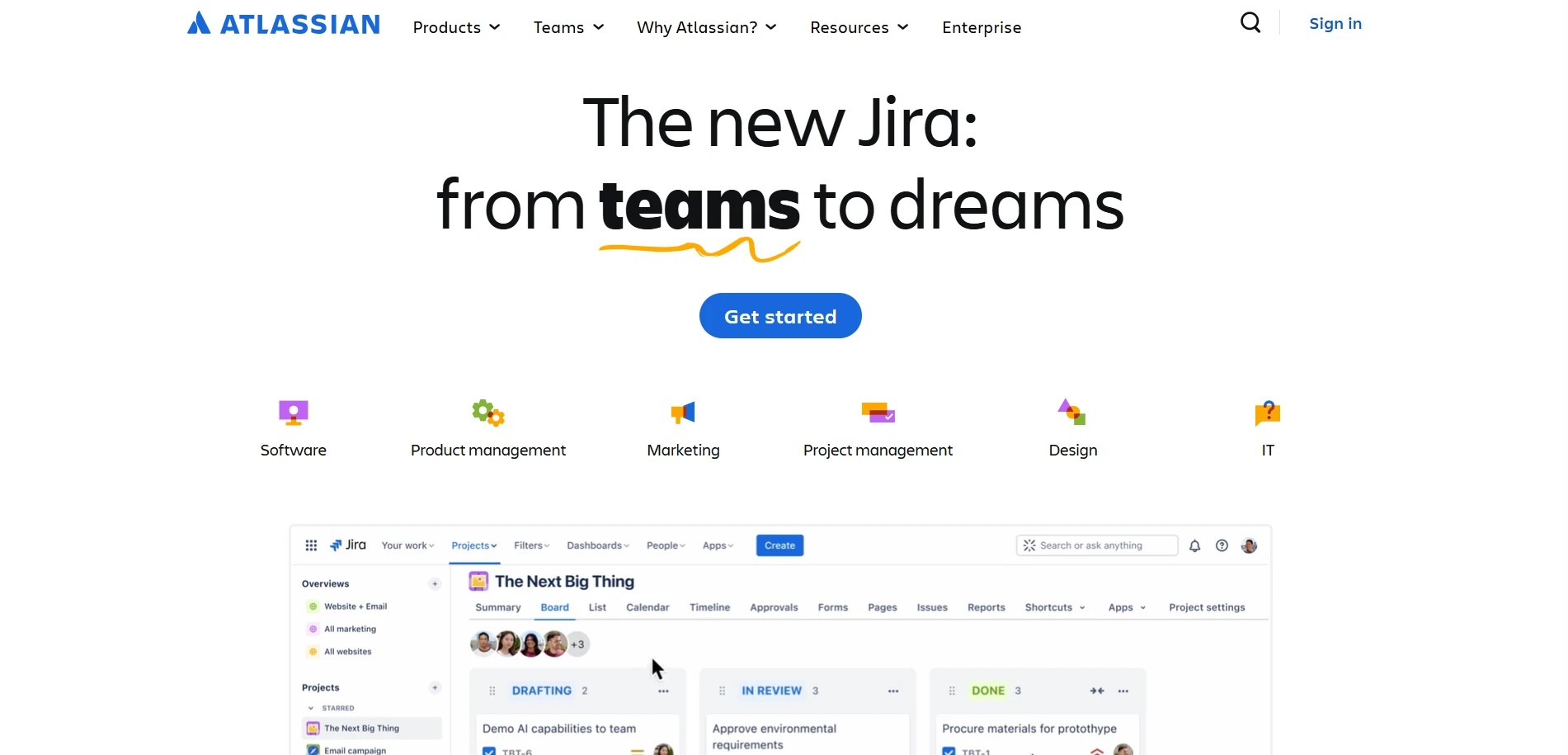 Source: Atlassian
Source: AtlassianDetailed Key Features:
- Agile Project Management: Supports Scrum, Kanban, and hybrid methodologies.
- Collaboration Tools: Enhances team communication with Confluence.
- Customizable Workflows: Allows teams to tailor workflows.
- Integration Ecosystem: Extensive integrations with development tools.
- Automation: Streamlines tasks with automation rules.
- Reporting and Analytics: Provides insights with dashboards and reports.
- Security and Compliance: Ensures data protection with advanced features.
User Interface and Experience Analysis:
Atlassian's interface is designed for flexibility and customization. The platform prioritizes functionality and user experience.
Implementation Complexity Assessment:
Implementing Atlassian tools requires careful planning. Extensive documentation and support assist with setup.
Integration Capabilities:
- Slack
- Microsoft Teams
- GitHub
- Bitbucket
- Jenkins
- Salesforce
- ServiceNow
Pros:
- Robust toolset: Comprehensive suite of tools.
- Agile support: Strong support for agile methodologies.
- Highly customizable: Tailors workflows and processes.
- Extensive integrations: Connects with development tools.
- Strong community: Supported by a vibrant user community.
- Continuous innovation: Regular updates and improvements.
Cons:
- Complex setup: Requires technical expertise.
- Learning curve: May require training.
- Cost considerations: Pricing can add up.
- Overwhelming for small teams: Extensive features may be unnecessary.
- Frequent updates: Regular adaptation needed.
Pricing Details:
- Free Tier: Basic features.
- Standard Plan: $7/user/month.
- Premium Plan: $14/user/month.
Best For:
- Industries: Technology, Software Development, Engineering
- Company Size: Medium to large teams
- Budget Considerations: Suitable for comprehensive solutions
- Use Cases: Ideal for teams needing robust tools.
Not Recommended For:
- Small teams with limited needs.
- Organizations with tight budgets.
Bottom Line:
Atlassian offers a powerful suite of project management tools for agile teams. Its extensive integration capabilities make it a top choice for tech-savvy teams.
5. FranklinCovey
FranklinCovey provides leadership and management training, emphasizing essential skills like time management and strategic planning. Its approach combines project management with leadership training.
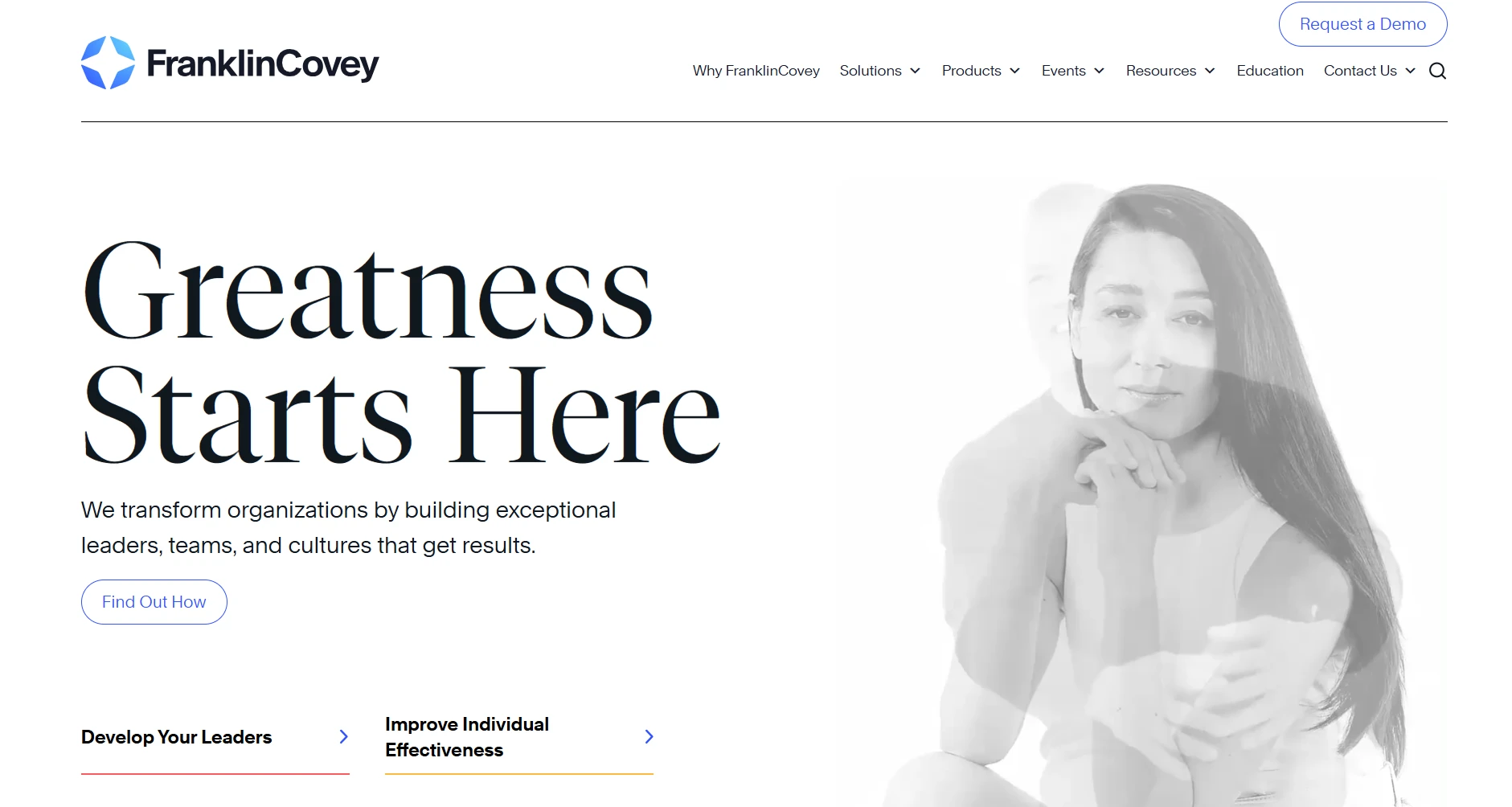 Source: FranklinCovey
Source: FranklinCoveyDetailed Key Features:
- Time Management: Teaches effective techniques.
- Strategic Planning: Provides frameworks for goals.
- Leadership Development: Offers training to enhance skills.
- Decision-Making Skills: Strengthens abilities.
- Change Management: Prepares managers for change.
- Conflict Resolution: Provides tools for resolving conflicts.
- Communication Skills: Enhances abilities.
User Interface and Experience Analysis:
FranklinCovey's platform facilitates learning with engaging content. The interface is user-friendly, supporting seamless navigation.
Implementation Complexity Assessment:
Courses are accessible online with minimal setup. Managers can begin learning immediately.
Integration Capabilities:
- Learning Management Systems (LMS)
- Corporate training platforms
Pros:
- Holistic approach: Combines management with leadership training.
- Proven methodologies: Utilizes time-tested techniques.
- Flexible learning: Offers online courses.
- Leadership focus: Enhances skills.
- Strong reputation: Well-respected brand.
- Engaging content: Interactive elements enhance learning.
Cons:
- Limited focus on project management: Emphasizes leadership.
- Higher course costs: Pricing may be prohibitive.
- Basic integration capabilities: Limited to certain platforms.
- No mobile app: Learning is web-based.
- Requires self-discipline: Demands time management skills.
Pricing Details:
- Course-Based Pricing: Varies by course.
Best For:
- Industries: Education, Professional Services, Consulting
- Company Size: Individuals and small teams
- Budget Considerations: Suitable for leadership development
- Use Cases: Ideal for enhancing leadership skills.
Not Recommended For:
- Teams needing comprehensive software.
- Organizations with limited training budgets.
Bottom Line:
FranklinCovey offers a holistic approach to management, emphasizing leadership and personal development. Its time-tested methodologies make it valuable for skill enhancement.
6. Coursera
Coursera partners with top universities and organizations to offer a wide range of courses, including project management. It provides learners with access to high-quality education.
 Source: Coursera
Source: CourseraDetailed Key Features:
- Diverse Course Offerings: Access to a range of courses.
- Specialization Tracks: In-depth knowledge in specific areas.
- Certification Opportunities: Provides certificates.
- Flexible Learning Options: Study at own pace.
- High-Quality Content: Developed by leading universities.
- Interactive Learning Modules: Engages learners.
- Access to Global Community: Connects learners.
User Interface and Experience Analysis:
Coursera's interface ensures ease of use. The clean design facilitates intuitive navigation.
Implementation Complexity Assessment:
The platform requires minimal setup. Courses are accessible via web or mobile app.
Integration Capabilities:
- Learning Management Systems (LMS)
- Corporate training platforms
Pros:
- Wide range of courses: Diverse selection.
- Flexible learning: Self-paced options.
- Certification: Enhances credibility.
- High-quality content: Developed by experts.
- Interactive elements: Engages learners.
- Global community: Connects learners.
Cons:
- Course costs can add up: Multiple courses may increase expenses.
- Limited hands-on practice: May lack practical opportunities.
- Basic integration capabilities: Limited to certain platforms.
- Requires self-discipline: Demands time management skills.
- No dedicated tool: Primarily a learning platform.
Pricing Details:
- Single Course: $39/month.
- Specialization Tracks: Varies by track.
Best For:
- Industries: Education, Professional Services, Consulting
- Company Size: Individuals and small teams
- Budget Considerations: Cost-effective for skill enhancement
- Use Cases: Ideal for formal education.
Not Recommended For:
- Large teams needing collaborative tools.
- Organizations needing extensive integration.
Bottom Line:
Coursera excels in providing flexible, high-quality education. Its focus on professional development makes it valuable for skill enhancement.
7. Google Grow
Google Grow provides accessible learning resources and certifications enhancing digital skills, including project management. It offers courses designed to equip managers with practical skills.
 Source: Google Grow
Source: Google GrowDetailed Key Features:
- Free Learning Resources: Access to free courses.
- Certification Opportunities: Offers certifications.
- Practical Skills Development: Focuses on real-world skills.
- Integration with Google Tools: Leverages Google's expertise.
- Flexible Learning Options: Study at own pace.
- High-Quality Content: Developed by Google experts.
- Access to Online Community: Connects learners
User Interface and Experience Analysis:
Google Grow's interface is clean and intuitive. The design emphasizes engagement and accessibility.
Implementation Complexity Assessment:
The platform requires minimal setup. Courses are accessible via web or mobile app.
Integration Capabilities:
- Google Workspace
- Learning Management Systems (LMS)
- Corporate training platforms
Pros:
- Free and affordable options: Access to free courses.
- Practical skills focus: Real-world applicability.
- Integration with Google tools: Enhanced learning.
- Flexible learning: Self-paced options.
- High-quality content: Developed by experts.
- Online community: Connects learners.
Cons:
- Limited course offerings: Focuses on digital skills.
- Basic integration capabilities: Limited to certain platforms.
- Requires self-discipline: Demands time management skills.
- No dedicated tool: Primarily a learning platform.
- Certification costs: Certifications may incur additional costs.
Pricing Details:
- Free Courses: Access to free materials.
- Certification: $39/month.
Best For:
- Industries: Technology, Marketing, Professional Services
- Company Size: Individuals and small teams
- Budget Considerations: Suitable for affordable options
- Use Cases: Ideal for digital skills enhancement.
Not Recommended For:
- Large teams needing comprehensive tools.
- Organizations needing extensive integration.
Bottom Line:
Google Grow offers accessible, high-quality resources focusing on practical skills development. Its integration with Google tools makes it valuable for digital skills enhancement.
8. LinkedIn Learning
LinkedIn Learning offers courses across various domains, including project management. It provides high-quality content that enhances skills and career prospects.
 Source: LinkedIn Learning
Source: LinkedIn LearningDetailed Key Features:
- Diverse Course Offerings: Access to a range of courses.
- Certification Opportunities: Offers certificates.
- Integration with LinkedIn: Showcase courses on profiles.
- Flexible Learning Options: Study at own pace.
- High-Quality Content: Developed by experts.
- Interactive Learning Modules: Engages learners.
- Access to Online Community: Connects learners.
User Interface and Experience Analysis:
LinkedIn Learning's interface ensures ease of use. The clean design facilitates intuitive navigation.
Implementation Complexity Assessment:
The platform requires minimal setup. Courses are accessible via web or mobile app.
Integration Capabilities:
- LinkedIn profiles
- Learning Management Systems (LMS)
- Corporate training platforms
Pros:
- Wide range of courses: Diverse selection.
- Flexible learning: Self-paced options.
- Certification: Enhances credibility.
- Integration with LinkedIn: Showcase courses.
- High-quality content: Developed by experts.
- Online community: Connects learners.
Cons:
- Course costs can add up: Multiple courses may increase expenses.
- Limited hands-on practice: May lack practical opportunities.
- Basic integration capabilities: Limited to certain platforms.
- Requires self-discipline: Demands time management skills.
- No dedicated tool: Primarily a learning platform.
Pricing Details:
- Basic Plan: $29.99/month.
- Premium Plan: $39.99/month.
Best For:
- Industries: Professional Services, Consulting, Education
- Company Size: Individuals and small teams
- Budget Considerations: Cost-effective for skill enhancement
- Use Cases: Ideal for formal education.
Not Recommended For:
- Large teams needing collaborative tools.
- Organizations needing extensive integration.
Bottom Line:
LinkedIn Learning offers flexible, high-quality education focusing on professional development. Its integration with LinkedIn profiles makes it valuable for skill enhancement.
9. ProjectManagement.com
ProjectManagement.com serves as an online community and resource hub, offering articles, webinars, templates, and tools. It emphasizes collaboration and knowledge sharing.
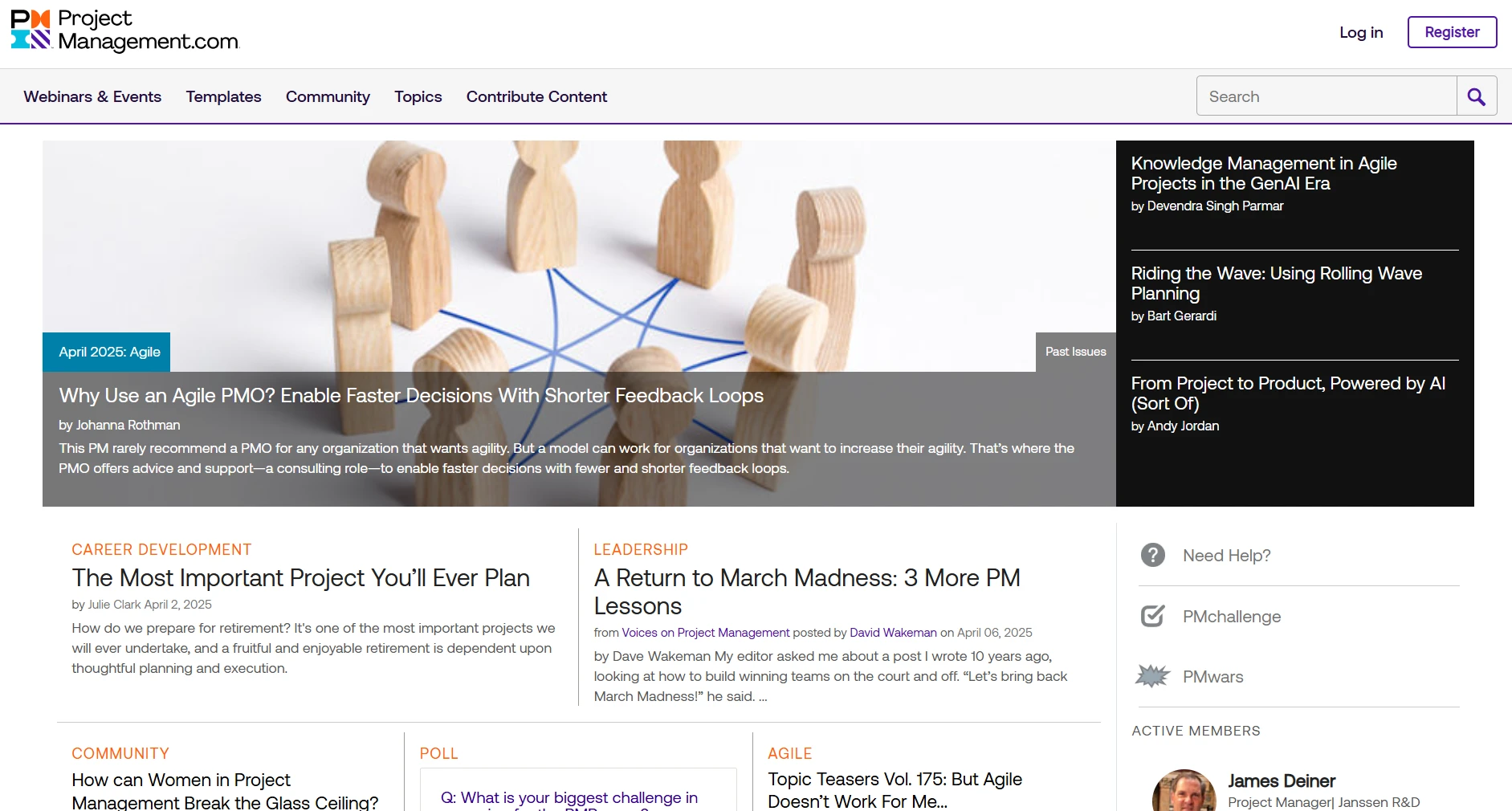 Source: ProjectManagment.com
Source: ProjectManagment.comDetailed Key Features:
- Community Forums: Connects managers with a global network.
- Webinars and Events: Access to live and recorded webinars.
- Templates and Tools: Library of resources.
- Articles and Insights: Provides expert insights.
- Resource Library: Comprehensive library of resources.
- Professional Development: Opportunities for growth.
- Certification Support: Resources for certification preparation.
User Interface and Experience Analysis:
The platform's interface facilitates easy access to resources. The emphasis on community enhances the user experience.
Implementation Complexity Assessment:
ProjectManagement.com requires minimal setup. Managers can access resources immediately.
Integration Capabilities:
- Learning Management Systems (LMS)
- Professional networking platforms
Pros:
- Strong community focus: Connects managers globally.
- Comprehensive resources: Offers articles and tools.
- Professional development: Opportunities for growth.
- Certification support: Resources for preparation.
- User-friendly interface: Easy access to resources.
- Knowledge sharing: Emphasizes collaboration.
Cons:
- Limited tools: Primarily a resource hub.
- Basic integration capabilities: Limited to certain platforms.
- No mobile app: Web-based access.
- Membership costs: Premium features require a subscription.
- Self-discipline required: Participation requires motivation.
Pricing Details:
- Free Membership: Access to basic resources.
- Premium Membership: $10/month.
Best For:
- Industries: Professional Services, Consulting, Education
- Company Size: Individuals and small teams
- Budget Considerations: Suitable for development
- Use Cases: Ideal for connecting with peers.
Not Recommended For:
- Teams needing comprehensive software.
- Organizations needing extensive integration.
Bottom Line:
ProjectManagement.com provides a platform for community and collaboration, offering access to resources and a global network. Its focus on knowledge sharing makes it valuable for skill enhancement.
10. Wrike
Wrike is a robust project management tool designed to streamline workflows and enhance productivity. Its customizable solutions meet the specific needs of different organizations.
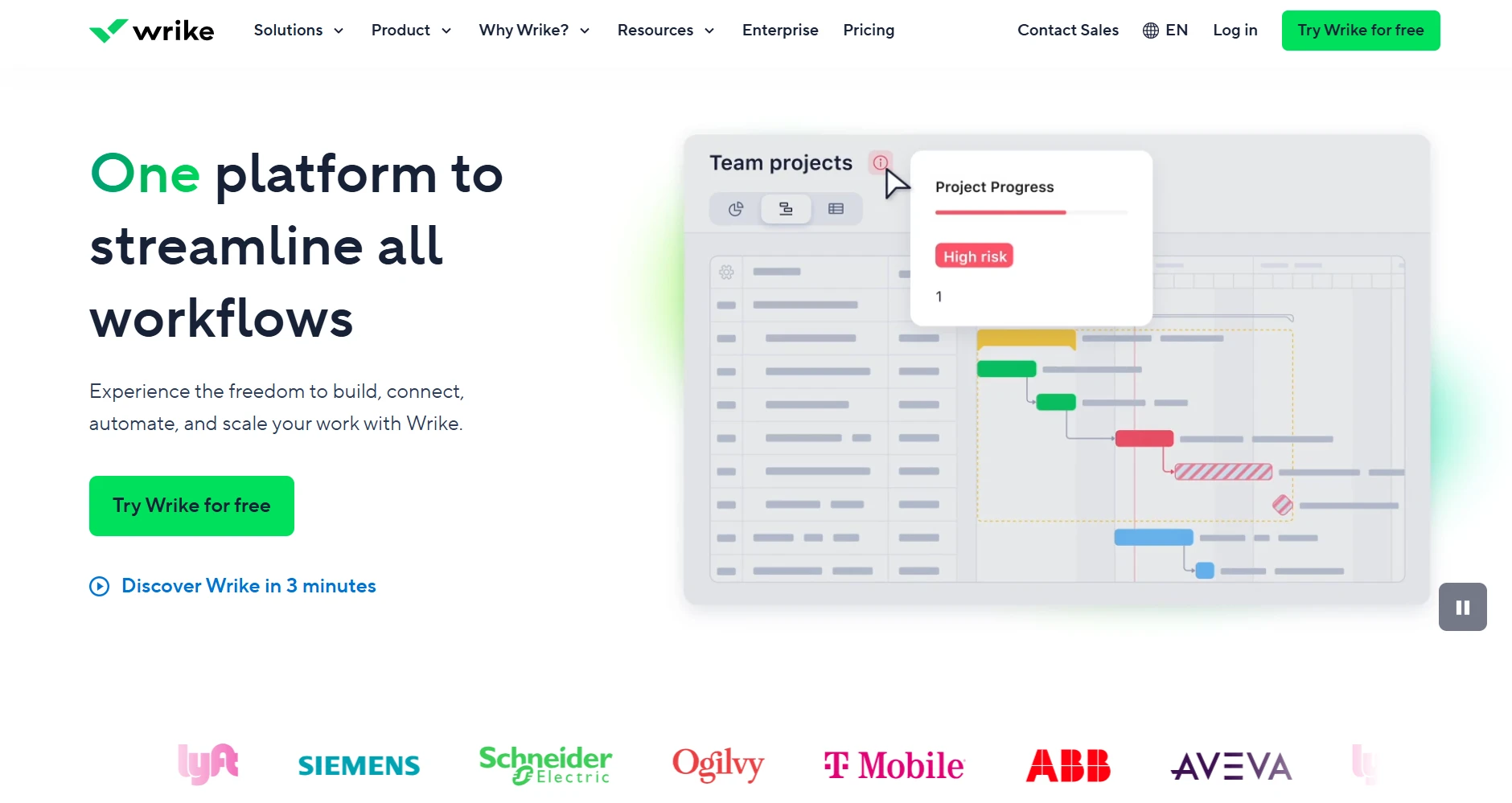 Source: Wrike
Source: WrikeDetailed Key Features:
- Task Management: Allows creating, assigning, and tracking tasks.
- Time Tracking: Real-time tracking of timelines.
- Resource Management: Tools for managing resources.
- Automation: Streamlines tasks with rules.
- Reporting and Analytics: Provides insights with dashboards.
- Integration Ecosystem: Extensive integrations enhance functionality.
- Security and Compliance: Ensures data protection.
User Interface and Experience Analysis:
Wrike's interface allows customization. The platform prioritizes functionality and user experience.
Implementation Complexity Assessment:
Implementing Wrike requires careful planning. Extensive documentation assists with setup.
Integration Capabilities:
- Slack
- Microsoft Teams
- Google Workspace
- Salesforce
- Dropbox
- Box
- Adobe Creative Cloud
Pros:
- Versatile toolset: Comprehensive features.
- Customizable solutions: Tailors workflows.
- Strong integration capabilities: Connects with tools.
- Advanced automation: Streamlines tasks.
- Scalability: Accommodates growth.
- Robust security: Ensures data protection.
Cons:
- Complex setup: Requires technical expertise.
- Learning curve: May require training.
- Cost considerations: Pricing can add up.
- Overwhelming for small teams: Extensive features may be unnecessary.
- Frequent updates: Regular adaptation needed.
Pricing Details:
- Free Tier: Basic features.
- Professional Plan: $9.80/user/month.
- Business Plan: $24.80/user/month.
Best For:
- Industries: Technology, Marketing, Consulting
- Company Size: Medium to large teams
- Budget Considerations: Suitable for comprehensive solutions
- Use Cases: Ideal for customizable solutions.
Not Recommended For:
- Small teams with limited needs.
- Organizations with tight budgets.
Bottom Line:
Wrike offers a versatile solution for various industries. Its customizable features make it a top choice for organizations seeking to streamline workflows.How to Choose
Evaluate your organization's specific needs, budget, and long-term goals when choosing a project management tool. Consider team size, project complexity, and integration requirements. Assess core features, pricing tiers, and scalability to determine alignment with business objectives. Additionally, evaluate customer support and training resources for smooth implementation and adoption.
Benefits of Project Management for Managers
Improved Efficiency
Project management tools streamline workflows and automate tasks, allowing managers to focus on strategic planning. Real-time insights help identify bottlenecks and optimize resource allocation, leading to improved efficiency.
Enhanced Collaboration
Project management platforms enhance communication and collaboration among team members, ensuring alignment towards common goals. Features like task assignments and real-time messaging foster a collaborative environment.
Better Risk Management
Effective project management involves risk identification and mitigation. Tools provide managers with insights to assess risks and develop contingency plans, minimizing disruptions.
Scalability
Scalable solutions accommodate growing project demands and team sizes, allowing organizations to expand efficiently. These tools adapt to changing business needs and priorities.
Informed Decision-Making
Project management tools offer valuable data and insights, enabling informed decision-making. Real-time reporting allows managers to assess performance and make data-driven decisions.
Conclusion:
Meegle stands out as a versatile project management solution for small to medium-sized businesses. Its comprehensive feature set, strong integration capabilities, and competitive pricing offer a high return on investment. Meegle's intuitive interface enhances collaboration and efficiency, supporting long-term organizational growth.
Get started with Meegle and experience a structured, easy, and intuitive approach to project management.
Build your workflow today!
FAQ Section
Q: What factors should I consider when choosing a project management tool?
A: Consider your organization's specific needs, budget, team size, and integration requirements. Evaluate core features, pricing tiers, scalability, customer support, and training resources.
Q: How do project management tools improve efficiency?
A: They streamline workflows, automate tasks, and provide real-time insights, allowing managers to optimize resource allocation and improve productivity.
Q: What are the benefits of integrating project management tools with other platforms?
A: Integration enhances functionality and collaboration by connecting tools with platforms like communication tools and CRMs, ensuring seamless data flow.
Q: Are there free project management tools available?
A: Yes, several tools offer free tiers with basic features suitable for small teams or organizations with limited needs.
Q: How can project management tools support remote teams?
A: They facilitate communication and collaboration among remote team members, ensuring alignment. Features like task assignments and real-time messaging enhance productivity.
The world’s #1 visualized project management tool
Powered by the next gen visual workflow engineRead More
Check All BlogsStart creating impactful work today
